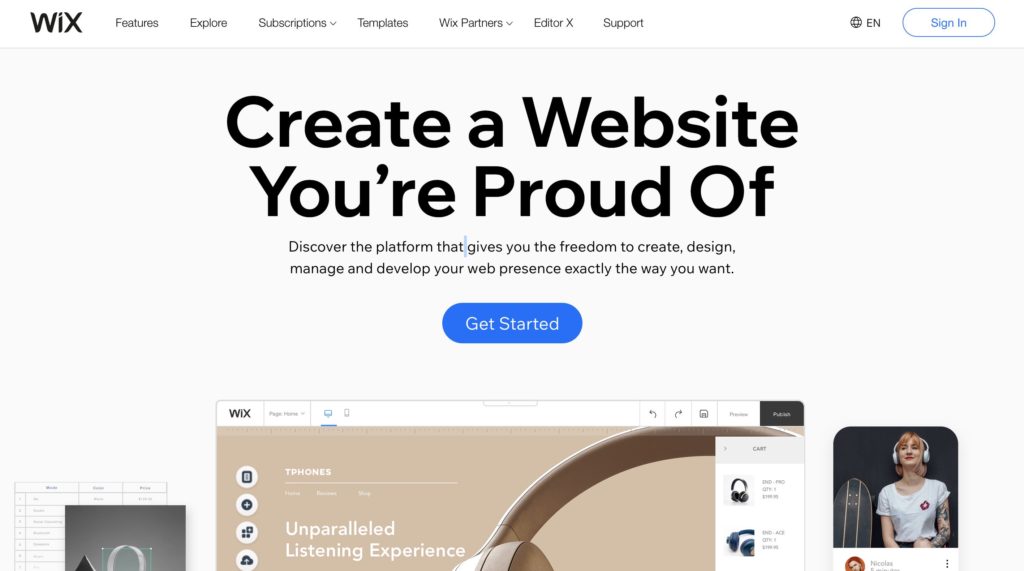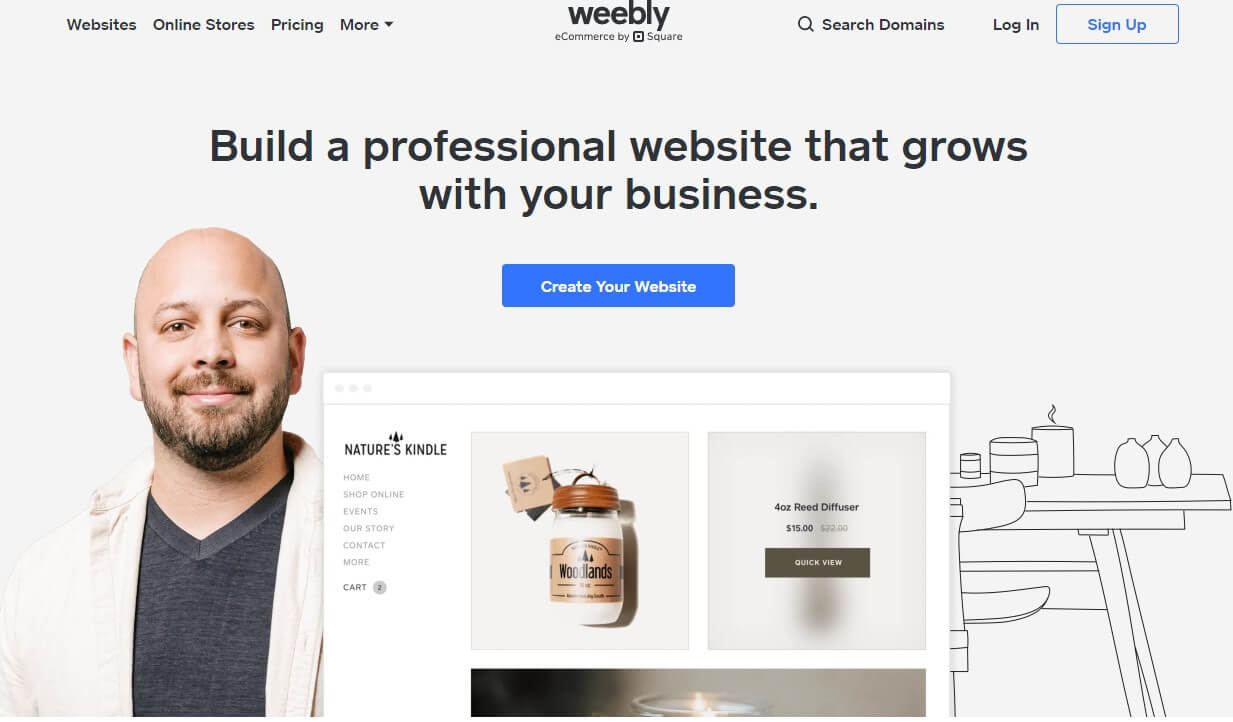For a small business, the best website builder is one that offers ease of use, professional templates, and affordable pricing. Squarespace and Wix are popular choices, with user-friendly interfaces and robust features to help small businesses create an impactful online presence.
These platforms offer customizable designs, e-commerce capabilities, and SEO tools to help businesses attract and engage customers. Additionally, they provide reliable hosting and customer support, making them ideal solutions for small businesses looking to establish a strong online presence. Whether you’re just starting or aiming to grow your business, these website builders offer the essential tools and features needed to succeed in the digital space.
Table of Contents
Website Builder For Small Business

Why Small Businesses Need A Website
Website Builder for Small Businesses is a crucial tool for small businesses that want to establish an online presence. With the world becoming increasingly digital, small businesses need to have a website to reach a wider audience and increase their online presence. In this article, we will discuss the importance of having a website for small businesses and how a website builder can help them achieve their goals.
Increasing Online Presence
A website is an excellent way for small businesses to increase their online presence. With a website, small businesses can showcase their products or services to potential customers 24/7. Having a website also makes it easier for customers to find the business when searching online. A website builder can help small businesses create a professional-looking website without the need for technical skills. Here are some benefits of having a website:
- Attract new customers who are searching for products or services online
- Provide information about the business, such as hours of operation and location
- Showcase products or services with images and descriptions
- Collect customer information through contact forms or newsletter sign-ups
Reaching A Wider Audience
A website is an excellent way for small businesses to reach a wider audience. With a website, small businesses can target customers beyond their local area. A website builder can help small businesses create a website that is optimized for search engines, making it easier for potential customers to find the business online. Here are some benefits of reaching a wider audience:
- Expand the customer base beyond the local area
- Target specific audiences through online marketing campaigns
- Provide customers with the convenience of online shopping
- Establish the business as a credible and professional entity
Benefits Of Using A Website Builder
Building a website for a small business is essential in today’s digital age. Utilizing a website builder offers numerous advantages, making it an ideal choice for small businesses looking to establish an online presence. This article explores the benefits of using a website builder, focusing on affordability, ease of use, and customization options.
Affordability
Using a website builder for small businesses is highly affordable as it eliminates the need for hiring professional web developers. Small businesses can save a significant amount of money by opting for a website builder, that offers cost-effective subscription plans. Additionally, many website builders provide free templates and design tools, reducing the overall expenditure for creating a professional website.
Ease Of Use
Website builders are designed with user-friendly interfaces, making them accessible to individuals with limited technical expertise. The intuitive drag-and-drop features and pre-built templates enable small business owners to create and manage their websites with ease. Moreover, website builders often include tutorials and customer support to assist users in navigating the platform and addressing any challenges they encounter.
Customization Options
Small businesses can achieve a unique online presence with website builders that offer extensive customization options. These platforms provide a wide range of templates, fonts, colors, and design elements, allowing businesses to tailor their websites to reflect their brand identity. Additionally, website builders often integrate with third-party applications and plugins, enabling businesses to add specific functionalities to their websites without extensive development knowledge.
Key Features To Look For In A Website Builder
A website builder for Small Businesses is a crucial tool for businesses looking to establish an online presence. With the right website builder, small businesses can create professional and user-friendly websites without the need for extensive technical knowledge or coding skills. In this blog post, we will explore the key features to look for in a website builder to ensure that your small business website stands out from the competition.
Responsive Design
One of the most important features to consider when choosing a website builder is responsive design. With more and more people accessing websites on mobile devices, it is essential that your website is mobile-friendly and adapts seamlessly to different screen sizes. A responsive design ensures that your website looks and functions well on smartphones, tablets, and desktop computers, providing a great user experience across all devices. When evaluating website builders, look for options that offer responsive templates or the ability to customize your website’s design for different screen sizes.
Seo Tools
Another crucial feature to look for in a website builder is built-in SEO tools. Search engine optimization (SEO) is essential for improving your website’s visibility in search engine results and driving organic traffic. Look for website builders that offer features such as customizable meta tags, sitemaps, and URL structures, as well as the ability to optimize your website’s content for relevant keywords. These tools will help you optimize your website for search engines and improve your chances of ranking higher in search results.
E-commerce Integration
If you plan to sell products or services online, e-commerce integration is a key feature to consider in a website builder. Look for options that offer seamless integration with popular e-commerce platforms, such as Shopify or WooCommerce, as well as built-in shopping cart functionality and secure payment gateways. Additionally, features like inventory management, order tracking, and customizable product pages can enhance the overall e-commerce experience for your customers. Make sure the website builder you choose provides all the necessary tools to create and manage your online store effectively.

Top Website Builders For Small Businesses
Website Builders for Small Businesses and Top Website Builders for Small Businesses can greatly benefit entrepreneurs looking to establish an online presence. In today’s digital age, having a professional website is essential for reaching a wider audience and growing your business. Let’s explore some of the top website builders that cater specifically to small businesses.
Wix
Wix is a popular website builder known for its user-friendly drag-and-drop interface, making it easy for anyone to create a professional-looking website without any coding skills. With a wide range of templates and customization options, Wix allows small businesses to showcase their products and services effectively. Additionally, Wix offers affordable pricing plans suitable for businesses of all sizes.
Squarespace
Squarespace is an all-in-one platform that provides beautiful templates and a seamless website-building experience. Small businesses can create stunning websites with Squarespace’s intuitive design tools and built-in marketing features. From e-commerce capabilities to portfolio showcases, Squarespace caters to various business needs, helping entrepreneurs establish a strong online presence.
Weebly
Weebly offers a straightforward website-building process, perfect for small businesses looking to create a professional site quickly. With its drag-and-drop editor and responsive templates, Weebly enables businesses to design mobile-friendly websites that engage customers effectively. Weebly also provides e-commerce features and SEO tools to help businesses grow their online presence.
How To Choose The Right Website Builder
A website builder for Small businesses is a crucial tool for establishing an online presence. Choosing the right website builder is essential for small businesses to effectively showcase their products or services, attract customers, and generate sales. In this article, we will discuss how to choose the right website builder by identifying business needs, considering budget constraints, and reading user reviews.
Identify Business Needs
When selecting a website builder for your small business, it is important to assess your specific needs. Consider the purpose of your website, such as whether you need an online store or a simple informational site. Identify the features and functionalities you require, such as customizable templates, e-commerce capabilities, SEO optimization, and mobile responsiveness. Additionally, consider the scalability of the website builder to ensure it can accommodate your future business growth. By understanding your business needs, you can choose a website builder that aligns with your goals and objectives.
Consider Budget
Another crucial factor in choosing the right website builder for your small business is the budget. Determine how much you are willing to invest in building and maintaining your website. Some website builders offer free plans with limited features, while others require a monthly or yearly subscription. Take into account any additional costs, such as domain registration and hosting fees. It is essential to find a balance between affordability and the features you need to create a professional and functional website for your small business.
Read User Reviews
Before making a final decision, it is important to read user reviews and testimonials about different website builders. These reviews provide insights into the user experience, ease of use, customer support, and overall satisfaction with the platform. Look for reviews from small business owners who have similar needs and objectives as yours. Pay attention to any common concerns or issues raised by users and consider how these may impact your website-building experience. User reviews can help you make an informed decision and choose a website builder that has a positive reputation among its users.
Step-by-step Guide To Building A Website
If you’re a small business owner, having a website can be a game-changer. A website can help you establish an online presence, reach a wider audience, and even boost your sales. But where do you start? Building a website can seem like a daunting task, especially if you’re not tech-savvy. However, with the right website builder, building a website can be a breeze. In this step-by-step guide, we’ll walk you through the process of building a website for your small business.
Choose A Template
The first step to building a website is choosing a template. A template is a pre-designed website that you can customize to fit your needs. When choosing a template, consider the following:
- Choose a template that fits your brand and industry
- Consider the layout and design elements that you want to include
- Ensure that the template is mobile-friendly and responsive
Once you’ve chosen a template, you can start customizing it to fit your needs.
Customize Design
Customizing your website’s design is an essential step in building a website. Your website’s design should be visually appealing and reflect your brand’s personality. Here are some tips for customizing your website’s design:
- Choose a color scheme that matches your brand
- Use high-quality images and graphics
- Ensure that your website is easy to navigate
- Include clear calls to action to encourage visitors to take action
You can use a drag-and-drop editor to customize your website’s design without any coding skills.
Add Content
Once you’ve customized your website’s design, it’s time to add content. Your website’s content should be informative and engaging, and it should provide value to your visitors. Here are some tips for adding content to your website:
- Create a homepage that introduces your business and its products or services
- Include an “About Us” page that tells your brand’s story
- Create product or service pages that provide detailed information about what you offer
- Include a contact page that makes it easy for visitors to get in touch with you
By following these steps, you can build a professional website for your small business without any hassle.

Tips For Optimizing Small Business Websites
Website Builder for Small Businesses and Tips for Optimizing Small Business Websites…
Optimize For Mobile
Nowadays, mobile optimization is crucial for small business websites. With the increasing use of mobile devices, it is essential to ensure that your website is responsive and user-friendly on all screen sizes. This includes fast-loading pages, easy navigation, and clear call-to-action buttons for mobile users. Additionally, optimizing images and using mobile-friendly fonts can enhance the overall mobile experience for visitors.
Use Relevant Keywords
Using relevant keywords strategically throughout your website can improve its visibility on search engines. Conduct keyword research to identify the most relevant and high-traffic keywords for your business. Incorporate these keywords into your page titles, headings, meta descriptions, and content. However, it’s important to avoid keyword stuffing and focus on creating valuable and engaging content that naturally incorporates the chosen keywords.
Regularly updating Content
Regularly updating your website’s content can have a positive impact on its search engine rankings and user engagement. By adding fresh content, such as blog posts, news updates, or product information, you can demonstrate that your website is active and relevant. This can also encourage visitors to return to your site and increase the likelihood of earning backlinks from other websites, further boosting your SEO efforts.
Common Mistakes To Avoid When Building A Small Business Website
Building a website for a small business is crucial for establishing an online presence. However, there are common mistakes that should be avoided to ensure the website’s success.
Overcomplicating Design
When creating a small business website, it’s important not to overcomplicate the design. Simple and user-friendly layouts are more effective in engaging visitors. Avoid cluttered interfaces that confuse users.
Ignoring Seo
Ignoring SEO practices can hinder your website’s visibility in search engine results. Implementing relevant keywords, meta descriptions, and quality content is essential for attracting organic traffic.
Neglecting Mobile Optimization
Neglecting mobile optimization can result in a poor user experience for visitors accessing your site from smartphones and tablets. Ensure your website is responsive and mobile-friendly to reach a wider audience.
Conclusion
In the fast-paced world of small business, having a professional and user-friendly website is essential. With the help of a website builder, you can create a stunning online presence without any coding skills. From Squarespace to Wix, there are various options available to suit your specific needs.
These platforms offer drag-and-drop editors, customizable templates, and SEO tools to help your website rank higher in search engine results. So, don’t let the lack of technical expertise hold you back. Take advantage of the website builders and watch your small business thrive online.
